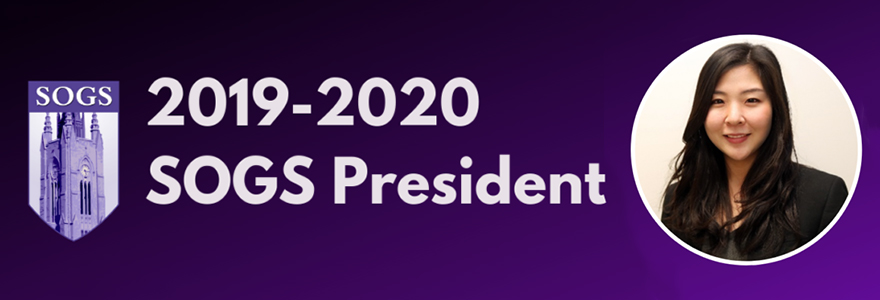New SOGS President Jina Kum Prepared to Meet Upcoming Challenges

By Emily Leighton, MA'13
Jina Kum is an expert at living uncomfortably. Earlier this year, the quiet, introspective graduate student stepped into the spotlight of a campus-wide election campaign.
And as the newly elected President of the Society of Graduate Students (SOGS) at Western, she now leads an organization that represents more than 6,200 graduate students on campus.
“If you asked me a few years ago to go for this role, I would have laughed and said absolutely not,” she said. “It’s definitely outside my comfort zone.”
With experience serving as the Society’s VP Academic for two years before launching her successful presidential bid, Kum has a solid foundation in student politics. She says getting involved with SOGS was a way to branch out and make connections. “Grad students often encounter a sense of isolation,” she said. “For me, it was an opportunity to meet other students from across campus and contribute positively to the student experience.”
The PhD candidate is setting ambitious goals for her one-year presidential term. She hopes to renew the group’s strategic plan and look at how it can better serve its graduate student members.
One unanticipated hurdle for Kum as she begins her presidency is the Ontario government’s Student Choice Initiative, a plan that allows university and college students to opt-out of ancillary fees that the government has labelled non-essential.
Under the plan, student unions and groups are considered non-mandatory, meaning the SOGS budget will depend on students who decide to opt-in. “There is huge uncertainty,” said Kum. “This will have a big impact on how we will be moving forward with services and support for our members. We’re trying to prep to the best of our abilities, but there are a lot of unknowns at the moment.”
Kum was born in South Korea and arrived in Canada with her family at the age of six. She grew up in Toronto’s North York neighbourhood. A high school co-op placement at Sick Kids inspired the future scientist to pursue health research.
Kum completed the BMSc program at Schulich Medicine & Dentistry in 2013, specializing in pathology and toxicology. A master’s degree followed in 2015, focused on infantile hemangiomas, which are abnormal buildups of blood vessels in the skin or internal organs.
The research opportunities and dynamic lab environment encouraged her to pursue a PhD with supervisors Zia Khan, PhD, and Christopher Howlett, MD, PhD. "Zia is a fantastic mentor and a great scientist. He is really invested in training his students, so that was a big reason to stay on," she said. "Chris is a dedicated clinician-scientist, and I have come to appreciate the clinical aspects of my research under his mentorship."
Kum’s doctoral research explores how diabetes affects stem cells within the bone marrow. Called vasculogenic stem cells, these cells could potentially repair the damage to blood vessels that leads to diabetic complications, such as sight loss or kidney disease.
“A lot of the problems diabetic patients encounter are a result of diabetic complications, not the disease itself,” said Kum.
Previous work in the lab has shown that diabetic patients have less vasculogenic stem cells than those without the condition.
“Diabetic patients have much more fat in their bone marrow,” she explained. “We think the loss of stem cells is due to the changing composition, so if we can prevent fat cells in the marrow, then we may be able to inhibit the depletion of stem cells.”
The 28-year-old is hoping to blend her training in basic science with her interests in health policy work, considering a career that would take her outside academia. “Graduate students are often focused on the traditional route because that’s what our mentors did,” she said. “But there are so many other opportunities open to us.”
With demanding academic and leadership commitments, Kum says keeping up with her busy schedule is challenging but rewarding. “I think all graduate students can relate. Research doesn’t stop after 5:00 p.m.,” she said with a laugh. “But it’s important to take risks and get outside your comfort zone. You find out more about yourself that way.”








